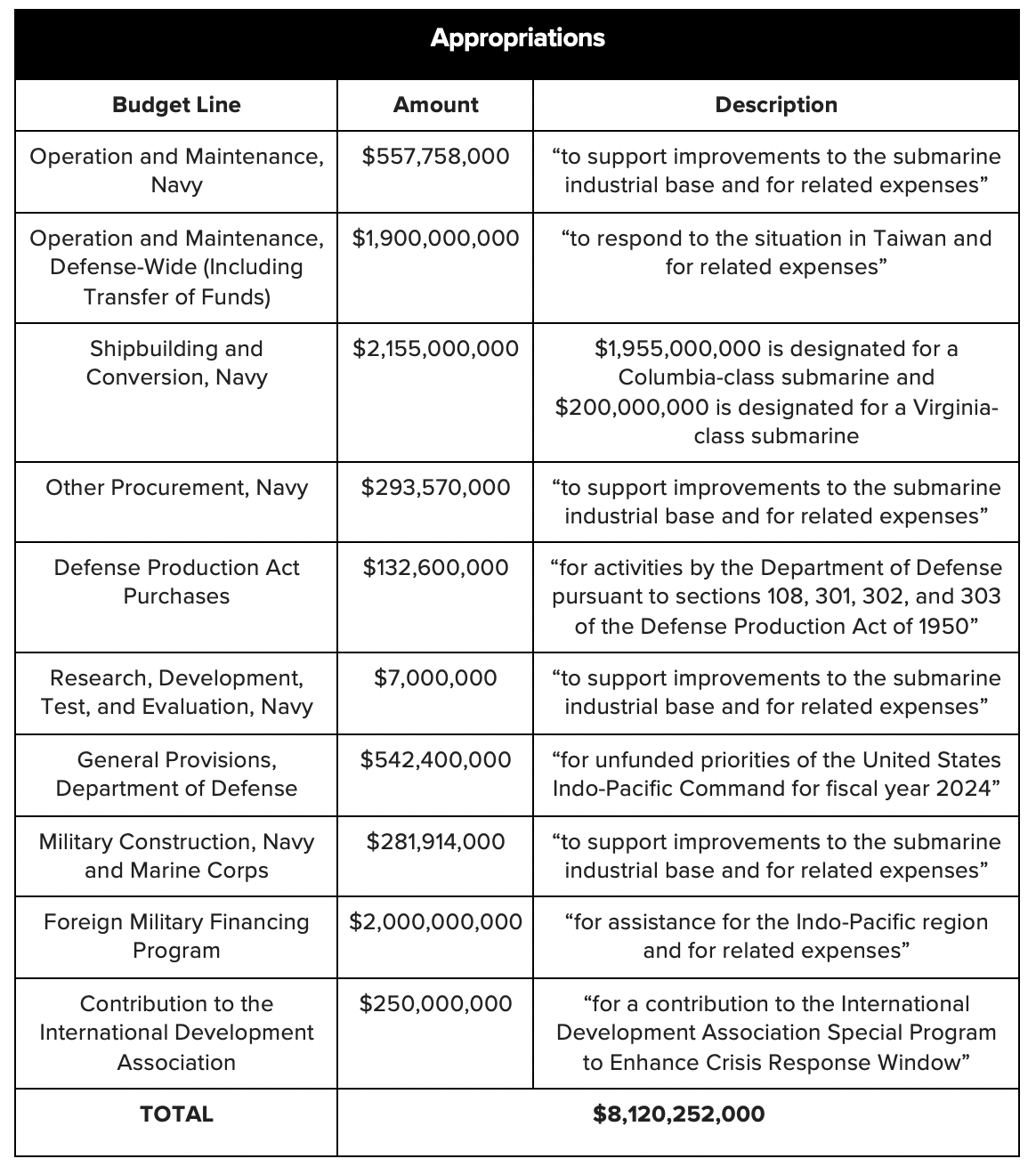A nation must think before it acts.
In October 2023, the White House requested emergency supplemental appropriations for Fiscal Year 2024 to provide additional aid to Ukraine, Israel, and the Indo-Pacific. After months of debate, the House of Representatives passed an emergency $8.1 billion supplemental appropriations bill to support Indo-Pacific priorities. The content is very similar to the Senate version, and President Joe Biden has stated that he supports the bill. While media reports have labeled this bill as Taiwan aid, the actual provisions have a much more significant impact beyond Taiwan.
Submarine Industrial Base
For decades, American naval shipbuilding has stagnated. According to a new report commissioned by Secretary of the Navy Del Toro, the Navy faces years of delays for several major shipbuilding projects. Defense budget cuts, skilled-labor shortages, confusing demand signals, and supply chain challenges have all contributed to the crisis. Submarine shipbuilding has particularly suffered. The United States has recently produced 1.2 Virginia-class submarines a year, well below the required production rate of two a year. The White House’s plan to sell three to five submarines to Australia under the AUKUS trilateral has increased concerns about domestic shipbuilding capacity and fleet size. Using the White House’s request as a guide, the House emergency supplemental addresses some lingering concerns about maritime infrastructure.
In total, $3.3 billion has been appropriated to support the submarine industrial base. While this investment will certainly bolster deterrence in the Indo-Pacific, it will have a much more immediate impact on American jobs. $1.9 billion was designated for the construction of a Columbia-class submarine and $200 million for a Virginia-class submarine. The vast majority of this money will be spent in the United States. Groton, Connecticut and Newport News, Virginia are the two largest submarine shipyards and will benefit from this influx of cash. However, Groton and Newport News will not be the only beneficiaries. More than 16,000 suppliers across all 50 states contribute to the submarine industrial base and will benefit from this new appropriation. Additionally, $7 million was appropriated for research and development, supporting numerous laboratories and research facilities.
Nearly half of the Indo-Pacific appropriations directly reinforce the submarine industrial base. While this investment will enhance deterrence in the Indo-Pacific, the immediate impact will be supporting the American economy.
Talking Tough and Doing Tough
One of the most significant line items is $2 billion in Foreign Military Financing (FMF) “for assistance for the Indo-Pacific region and for related expenses.” Despite many in Washington raising concerns about Chinese coercion toward Taiwan, only recently has Congress taken commensurate actions to support Taiwan.
FMF aid is a critical tool for supporting American allies and partners. FMF allows designated nations “to purchase US defense articles, services, and training through either foreign military sales or, for a limited number of countries, through the foreign military financing of direct commercial contracts program.” The National Defense Authorization Act for Fiscal Year 2023 was the first time Congress authorized the provision of FMF for Taiwan: up to $2 billion a year in direct loans and loan guarantees and up to $2 billion a year in grant assistance through FY2027. However, the grant assistance was not appropriated. In June 2023, the Biden Administration approved FMF assistance for the first time to Taiwan. It remains unclear if the Biden Administration will use all $2 billion appropriated.
Looking Ahead
As US military support for Ukraine has starkly shown, the US defense industrial base has atrophied over the years. Fixing these issues now is preferable to doing so during a contingency. The considerable investment in the submarine industrial base is promising. Additionally, the $2 billion allocation of FMF to Taiwan indicates that Congress is getting more serious about supporting Taiwan’s defense. Washington must build off this supplemental. In general, military shipbuilding remains slow and insufficient. While FMF loans are helpful, appropriators should allow for FMF grants to better bolster Taiwan’s military. The passing of this emergency supplemental is a much-needed victory.

The views expressed in this article are those of the author alone and do not necessarily reflect the position of the Foreign Policy Research Institute, a non-partisan organization that seeks to publish well-argued, policy-oriented articles on American foreign policy and national security priorities.



